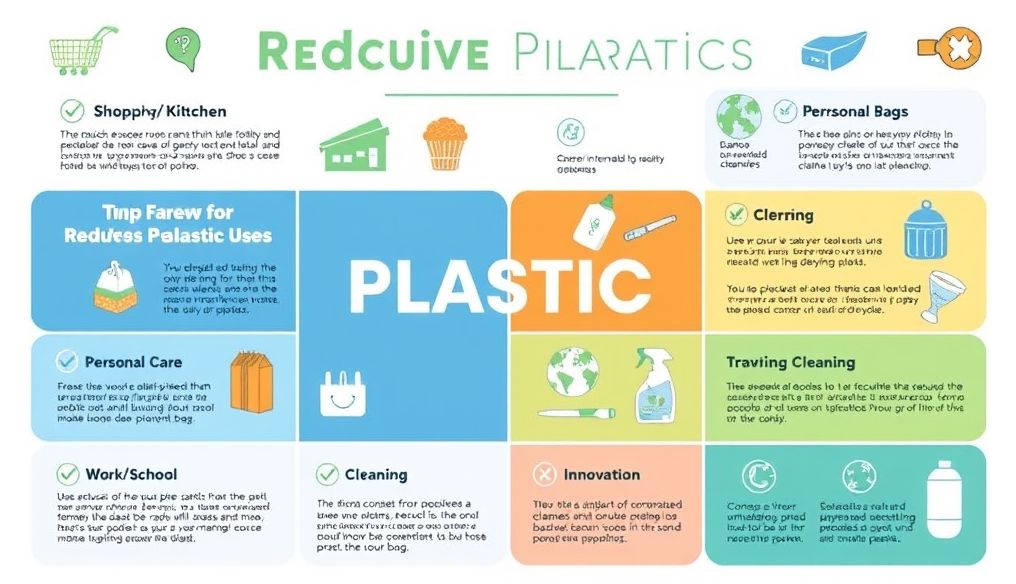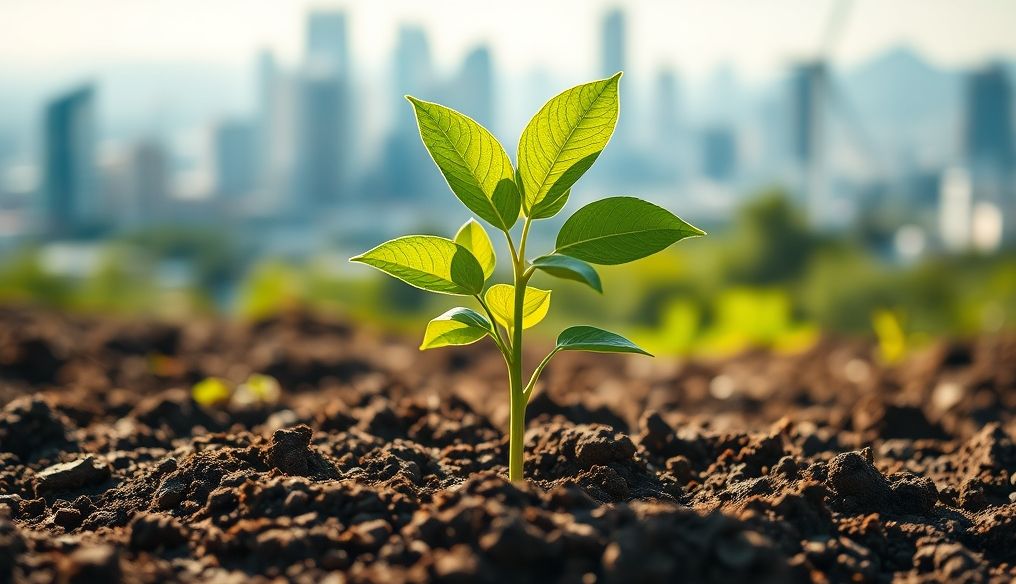Introduction: Why Should We Reduce Plastic Use?
Plastic is one of the most widely used materials in modern times, due to its light weight, durability, and low cost. However, these features hide a serious environmental problem. Plastic is not biodegradable and accumulates in the environment, leading to soil and water pollution, and harming wildlife.
Statistics show that millions of tons of plastic end up in the oceans every year, posing a direct threat to marine life. In addition, plastic can leach into the food chain, indirectly affecting human health.
Therefore, reducing plastic use is not just an option, but an urgent necessity to preserve the health of our planet and the future of our coming generations.
Chapter 1: Smart Shopping and Reducing Plastic
1.1 Use Reusable Cloth Bags
Replace plastic bags with durable, reusable cloth bags. Keep these bags in your car or near the door to remember them when you go shopping.
1.2 Choose Products with Less Packaging
When shopping, try to choose products that come with less packaging. Look for products sold in bulk or that can be purchased without packaging at all, such as fresh fruits and vegetables.
1.3 Support Stores That Sell Products in Bulk
Favor stores that sell products in bulk or allow you to refill your own containers. This reduces the need to buy individually packaged products.
1.4 Avoid Buying Bottled Water
Instead of buying bottled water, use a reusable water bottle and fill it from the tap or a water filter. This saves you money and reduces the amount of plastic you consume.
Chapter 2: The Plastic-Free Kitchen
2.1 Use Glass or Metal Containers for Food Storage
Replace plastic food containers with glass or metal containers to store leftovers or prepare lunches. These containers are healthier, more durable, and reusable.
2.2 Use Beeswax Wraps Instead of Plastic Wrap
Beeswax wraps are a natural and reusable alternative to plastic wrap. They can be used to cover dishes, bowls, and foods.
2.3 Use Wooden or Bamboo Cutting Boards
Replace plastic cutting boards with wooden or bamboo boards. These boards are healthier and more environmentally friendly.
2.4 Prepare Food at Home
When you prepare food at home, you can control the ingredients and packaging. This reduces your reliance on ready-made and packaged foods.
Chapter 3: Sustainable Personal Care
3.1 Use a Bamboo Toothbrush
A bamboo toothbrush is an environmentally friendly alternative to a plastic toothbrush. Bamboo is a renewable and biodegradable material.
3.2 Use Solid Soap and Shampoo
Solid soap and shampoo come without plastic packaging. You can find a variety of solid products in specialty stores.
3.3 Use Reusable Metal Razors
Reusable metal razors are a sustainable alternative to disposable plastic razors.
3.4 Use Reusable Organic Cotton Pads
Replace regular cotton pads with reusable organic cotton pads to cleanse the skin or remove makeup.
Chapter 4: Eco-Friendly Home Cleaning
4.1 Prepare Homemade Cleaners
You can prepare homemade cleaners using natural ingredients such as vinegar, lemon, and baking soda. These cleaners are effective, safe, and environmentally friendly.
4.2 Use Refillable Spray Bottles
Use refillable spray bottles to store homemade cleaners or buy liquid cleaners in bulk and refill them.
4.3 Use Reusable Cleaning Cloths
Replace paper towels with reusable cleaning cloths. You can wash these cloths and use them over and over again.
Chapter 5: Reducing Plastic Use at Work and School
5.1 Bring Lunch in a Reusable Container
Instead of buying lunch in plastic containers, bring lunch in a reusable container.
5.2 Use a Wooden Pencil and a Refillable Ink Pen
Use a wooden pencil and a refillable ink pen instead of disposable plastic pens.
5.3 Bring a Reusable Coffee or Tea Cup
If you drink coffee or tea at work or school, bring a reusable cup instead of using plastic or paper cups with a plastic lining.
Chapter 6: Sustainable Travel and Reducing Plastic
6.1 Carry a Reusable Water Bottle
When traveling, carry a reusable water bottle and fill it from the tap or a water filter in the hotel or airport.
6.2 Use a Reusable Cloth Travel Bag
Use a reusable cloth travel bag to carry your personal belongings instead of plastic bags.
6.3 Choose Eco-Friendly Hotels and Restaurants
When traveling, look for hotels and restaurants that adopt eco-friendly practices, such as reducing plastic use and recycling.
Chapter 7: Responsible Plastic Disposal
7.1 Recycle Plastic
Make sure to recycle plastic properly. Check the recycling codes on plastic products and dispose of them in the designated recycling containers.
7.2 Support Recycling Programs
Support local recycling programs and participate in awareness campaigns about the importance of recycling.
7.3 Reduce Plastic Waste
Try to reduce the amount of plastic waste you produce by avoiding single-use plastic products and buying products with less packaging.
Chapter 8: Innovation in Alternative Plastics
8.1 Support Companies Developing Alternative Plastic Materials
Support companies that develop alternative plastic materials made from renewable and biodegradable materials, such as plant starch or algae.
8.2 Raise Awareness of the Importance of Innovation in Plastics
Participate in raising awareness about the importance of innovation in alternative plastics and encourage research and development in this field.
8.3 Support Government Policies That Encourage the Use of Alternative Plastics
Support government policies that encourage the use of alternative plastics and reduce the use of traditional plastics.
Conclusion: A Plastic-Free Future
Reducing plastic use in our daily lives requires a change in habits and behaviors. However, this change is necessary to preserve the health of our planet and the future of our coming generations. By adopting these tips and innovative solutions, we can all contribute to building a plastic-free future.
Important Statistics:
- More than 8 million tons of plastic enter the oceans every year.
- Plastic takes hundreds of years to decompose in the environment.
- Less than 9% of the plastic produced globally is recycled.
Additional Tips:
- Look for plastic alternatives for the products you use regularly.
- Participate in beach and public space cleanup campaigns.
- Talk to your friends and family about the importance of reducing plastic use.




